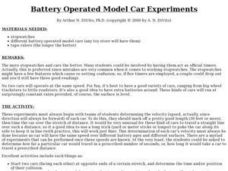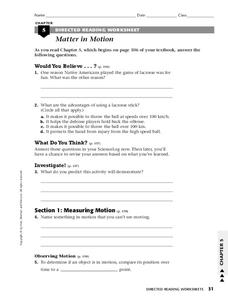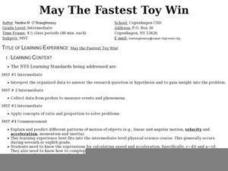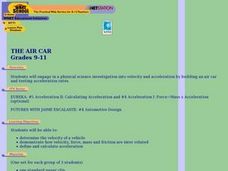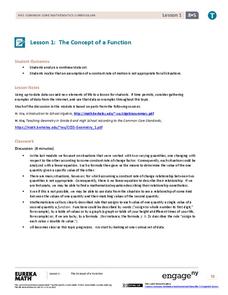EZ Task
Forces
Investigate force, acceleration, Newtons, and vectors with this learning exercise packet that starts with an overview fact sheet for reference. Learners label images as either push or pull forces, indicating if the force causes a change...
Bowels Physics
Magnetic Fields and Forces
Every knows that opposites attract! Here's a presentation that uses this background knowledge to explain magnetic fields and forces. The resource also explains the shape of magnetic fields and how to determine the direction of forces.
Curated OER
Battery Operated Model Car Experiments
Students time battery operated cars over a set track and determine the velocity of each type of car. They use the cars as manipulatives to demonstrate word problems involving velocity.
Curated OER
Acceleration
High schoolers develop an understanding of velocity and to distinguish it from speed. To determine the difference between a scalar and a vector quantity. To explore how acceleration is derived from velocity and time.
Curated OER
Precalculus Worksheet 8.3
In the precalculus worksheet, learners compute vectors and angle directions from given equations. They read and interpret information from three word problems to determine direction, speed, and the velocity vector in navigation problems.
Curated OER
Einstein's Big Idea
Students investigate the meaning of c2 in E=mc2 by measuring the energy delivered by an object falling at different velocities. They state that kinetic energy is the energy of an object in motion. Students illustrate how kinetic energy...
Curated OER
Matter in Motion
For this matter in motion worksheet, students answer the provided questions as it relates to motion, speed, velocity, and acceleration. Students mark given statements as either true or false.
Curated OER
Electrons and Atoms
In this atoms worksheet, students determine the velocity, wavelength, power, and frequency of given atoms. Student describe wave-particle duality and give the principle and angular quantum numbers for given orbitals. This worksheet has...
Curated OER
May The Fastest Toy Win
Middle schoolers determine which wind-up toy is the fastest. However, they can NOT race the toys. They must find another way. On the first day of the activity, students work in pairs or small groups to develop and write a plan.
Curated OER
That Mu You Do
Students discussion frictional force, kinetic friction, and static friction and the role each plays in acceleration and velocity in relationship to a car and the road on which it is traveling. Students complete lesson answering review...
Curated OER
Circular Motion: Target Practice
Students demonstrate direction of velocity of an object in circular motion. They discuss the mathematical formula, and demonstrate the formula using a string, rubber stopper and a target.
Curated OER
Numerical Determination of Drag Coefficients
Students create a video of an object falling with a drag. In this physics instructional activity, students calculate drag coefficient using data from Logger Pro. They calculate velocity and acceleration of the object.
Curated OER
Creating Impact Craters
Sixth graders simulate the creation of impact craters on Mars.Through the creation of model surfaces, the effects of an impacting object's mass, velocity and size are determined, and the features of the resulting crater are identified.
Curated OER
Super Gelatin
Students investigate the refraction properties of gelatin to calculate its index of refraction. They discover that as the light travels through the gelatin, its speed and wavelength also change. Students find th indes of refraction of an...
Curated OER
The Air Car
Students, in groups, design and construct an air car capable of acceleration. They view a video on acceleration, test their cars and make adjustments as desired.
Curated OER
Dude, Who Hit My Car?
Students discuss how investigators solve a hit and run accident. For this physical science lesson, students recreate an accident scene using CEENBot. They collect data from the experiment and formulate conclusion.
Curated OER
Forces and Pressure
In this forces worksheet, students will review the different types of forces and how forces are measured. This worksheet has 9 fill in the blank, 1 short answer, and 11 multiple choice questions.
Mathematics Vision Project
Module 6: Trigonometric Functions
Create trigonometric functions from circles. The first lesson of the module begins by finding coordinates along a circular path created by a Ferris Wheel. As the lessons progress, pupils graph trigonometric functions and relate them to...
It's About Time
Automatic Triggering Devices
How does the air bag trigger in an accident? The lesson explores how automatic triggering devices work in automobiles. Using examples such as a seat belt lock and air bag, scholars design their own device to better understand the...
It's About Time
Cushioning Collisions (Computer Analysis)
Did you know the car bumper is specifically designed to save the car and not the passengers in case of an accident? Young scientists use a computer, a force probe, and a sonic ranger to experiment with external cushioning on cars.
Teach Engineering
Microfluidic Devices and Flow Rate
When you have to flow, you have to flow. The lesson introduces class members to microfluidic devices and their uses in medicine. They watch a short video on how the diameter affects the rate of flow. The worksheet has individuals...
EngageNY
The Concept of a Function
Explore functions with non-constant rates of change. The first installment of a 12-part module teaches young mathematicians about the concept of a function. They investigate instances where functions do not have a constant rate of change.
Curated OER
Educating K-12 Students about Glacier Dynamics in a Changing Climate
Students determine which of the following parameters, slope, ice, temperature or basal condition affects the glacier speed the most. They create their own experiment to test what influences glacier speed and temperature of the ice.
Curated OER
Arc Length Lesson
Students find the length of the arc of a circle. In this geometry lesson plan, students calculate the length of an arc and find the measure of the central angle given the length of the arc. They convert between linear and angular speed....




